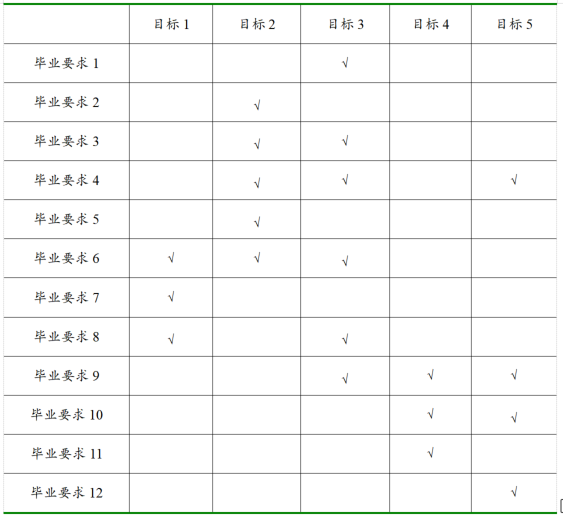複合材料與工程專業本科培養方案(2018版)
Undergraduate Program for Composite materials and engineering
學科門類:工學 二級類:材料類 專業編号:080206
Discipline:Engineering Secondary discipline:Materials Major Code:080206
一、培養目标
I. Cultivation Objectives
堅持立德樹人根本任務,培養德智體美勞全面發展的社會主義合格建設者和可靠接班人,具備“知識、能力、品格”協調發展,具備材料科學與工程的基礎知識和複合材料與工程的專業知識,能夠在複合材料的結構設計、成型加工和應用等領域從事産品研究開發、工藝設計、質量控制、運行管理等工作的高素質應用型創新人才。
本專業畢業生通過5年左右的工作實踐,預期達到以下目标:
目标1:具有良好的職業道德和社會責任感,有意願并有能力服務社會;
目标2:能夠解決複合材料的結構設計、成型加工和應用等領域中的複雜工程問題;
目标3:能夠從事複合材料技術與産品研發、工藝與設備設計、産品設計和生産技術管理等工作,成為單位的技術與管理骨幹;
目标4:具有團結協作精神,善于與國内外同行、專業客戶和公衆進行廣泛交流;
目标5:通過自主學習、工作實踐,實現能力和技術水平的不斷提升。
二、畢業要求
II. Programme Outcomes
(一)畢業要求
1.掌握數學、自然科學、工程基礎和專業知識,并能将其用于解決複合材料生産及應用過程中的複雜工程問題。
2.能夠應用數學、自然科學和材料科學與工程的基本原理,識别、表達、并通過文獻研究分析複合材料生産與應用過程中的複雜工程問題,以獲得有效結論。
3.能夠設計針對複合材料複雜工程問題的解決方案,設計滿足需求的材料體系、結構形式與成型工藝,并能夠在設計環節中體現創新意識,考慮社會、健康、安全、法律、文化以及環境等因素。
4.能夠基于科學原理并采用科學方法,對複合材料制備、結構設計、性能等複雜工程問題進行研究,包括設計實驗、分析與解釋數據、并通過信息綜合得到合理有效的結論。
5.能夠針對複合材料制備、結構設計和性能中的複雜工程問題,開發、選擇與使用恰當的技術、資源、現代工程工具和信息技術工具,包括對複雜工程問題的預測與模拟,并能夠理解其局限性。
6.能夠基于複合材料工程相關背景知識進行合理分析,評價複合材料新産品、新技術、新工藝和複雜工程問題的解決方案對社會、健康、安全、法律以及文化的影響,并理解應承擔的責任。
7.樹立可持續發展的工程思想,能夠理解和評價針對複合材料複雜工程問題的工程實踐對環境、社會可持續發展的影響。
8.樹立和踐行社會主義核心價值觀,具有人文社會科學素養、社會責任感,能夠在複合材料工程實踐中理解并遵守工程職業道德和規範,履行責任。
9.具有一定的組織管理能力、表達能力、人際交往能力和團隊合作能力,能夠在多學科背景下的團隊中承擔個體、團隊成員以及負責人的角色。
10.能夠就複合材料複雜工程問題與業界同行及社會公衆進行有效溝通和交流,包括撰寫報告和設計文稿、陳述發言、清晰表達或回應指令,并具備一定的國際視野,能夠在跨文化背景下進行溝通和交流。
11.理解并掌握工程管理原理與經濟決策方法,并能在多學科環境中應用。
12.具有自主學習和終身學習的意識,有不斷學習和适應發展的能力,能及時了解複合材料領域最新理論、技術及國際前沿動态。
1.Having the knowledge of mathematics, science, engineering and professional knowledge required in the field of composite materials and engineering, and it can be applied to analyze and solve the complex engineering problems in the design, forming and application of composite materials.
2.Having the ability to apply the basic principles of mathematics, science and engineering to identify, express and analyze the complex engineering problems in the field of composite materials, and obtain the valid conclusions.
3.Having the ability to design a solution for the complex engineering problems in the field of composite materials, design the material system, structural style and forming process to meet the specific requirements, and the innovative consciousness should be expressed in the design process, and it should be taken into account the factors such as society, health, safety, law, culture and environment.
4.Having the ability to apply the basic theories and techniques to study the complex engineering problems in the field of composite materials, optimize the process and technology of composite materials, including design, analysis and interpretation, to obtain the valid conclusion.
5.Having the ability to develop, select and apply the appropriate technology, resource, engineering and information technology tools to solve the complex engineering problems, including the prediction and simulation of the complex engineering problems, and its limitations should be understood.
6.Have the ability to analyze and evaluate the effect of practices for professional engineering and solutions for complex engineering problem on society, health, safety, law and culture, and understand the responsibilities to be taken.
7.The idea of sustainable development can be used to understand and evaluate the effect of practices for complex engineering problems on the sustainable development of environment and society.
8.Having humanities, art and social responsibility, and have the ability to understand and comply with the ethics and standards in engineering practices, and fulfill responsibilities.
9.Having the ability of organization, management, expression, interpersonal interaction and teamwork, and have the ability to undertake the roles of individuals, team members and leaders in a multidisciplinary team.
10.Having the ability to communicate with industry colleagues and the public on complex engineering problems in the field of composite materials, including the reports, presentations and responses. And have the ability for communications and discussions in the cross-cultural background based on international vision.
11.Having the ability to understand and master the engineering management principles and economic decision methods in the field of composite materials, and it can be applied in the multidisciplinary environment.
12.Having the ability for self-learning and lifelong learning, and have the ability to learn and adapt to development to keep abreast of the latest theories, technologies and international trends in the field of composite materials.
附1:培養目标實現矩陣

(二) 畢業要求分解指标項及支撐課程列表





三、主幹學科及課程設置
Ⅲ. Primary Discipline and curriculum
1. 主幹學科:工科
Primary Discipline(s):Engineering
2. 核心課程: 材料化工基礎、複合材料力學、材料科學基礎、高分子化學、高分子物理、材料複合原理、複合材料工藝與設備、複合材料聚合物基體、複合材料結構設計、複合材料研究方法。
3. 主要實踐教學環節:材料類專業實驗I、材料類專業實驗II、材料類專業實驗III、複合材料課程設計、生産實習、畢業實習、畢業設計(論文)
四、學制與學位
Ⅳ. Length of Schooling and Degree
修業年限: 4年, 3-8年彈性學制。
授予學位:工學學士學位
五、畢業學分
Ⅴ. Graduation Requirements
總學分達到194分(各平台學分滿足最低要求)且第二課堂成績單合格,可準予畢業。
六、學分分配
Ⅵ. Credit Allocation

七、教學進程計劃表 / VII、Teaching Schedule Form
表一:通識課程平台 / Form 1:General Courses
通識必修課程(通修課)
General Compulsory Courses(General Required)


七、教學進程計劃表 / VII、Teaching Schedule Form
表二:學科基礎課程
Form II. Basic Course

七、教學進程計劃表 / VII、Teaching Schedule Form
表三:專業課程平台
Form 3: Major Courses


七、教學進程計劃表 / VII、Teaching Schedule Form
表四:創新創業課程平台
Form 4: Innovation & Entrepreneurship Courses Platform

七、教學進程計劃表 / VII、Teaching Schedule Form
表五:實踐教學平台
Form 5: Practical Teaching



